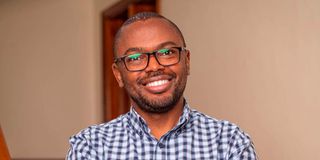Premium
A medical doctor with hopes of becoming a DJ

What you need to know:
- I am the middle child in a family of nine. My elder brother is a doctor and I grew up admiring the field.
- You can call it peer influence at a family level. Also, from an early age, I developed this ambition to work extra hard in academics.
- Three years after attaining a degree in medicine at the University of Nairobi, I won a commonwealth scholarship that enabled me to study Master of Science in Public Health at the London School of Hygiene and Tropical Medicine.
Matiko Riro, 38, is a medical doctor. He currently works as the regional technical advisor for Clinton Health Access Initiative (CHAI) where he leads technical work across the sub-Saharan region. He also works part time as an advisor at Gates Foundation to improve maternal health outcomes.
Did your childhood influence your career choice in any way?
Yes, it did. I am the middle child in a family of nine. My elder brother is a doctor and I grew up admiring the field. You can call it peer influence at a family level. Also, from an early age, I developed this ambition to work extra hard in academics. Three years after attaining a degree in medicine at the University of Nairobi, I won a commonwealth scholarship that enabled me to study Master of Science in Public Health at the London School of Hygiene and Tropical Medicine. What drives me is how far I can drive policy change within the health sector.
What is your greatest achievement?
That's a tricky question because success for me comes at different levels. Becoming a doctor was a big highlight for me, as was getting the commonwealth scholarship. At work, I pride myself in crafting policies that end up impacting people in countries I am yet to visit. That is satisfying.
You are in this year's list of Business Daily’s top 40 under 40 in the men’s category. How does that feel?
I am happy and humbled. Although the call came as a surprise, I knew that someone had nominated me and I felt proud. One of my colleagues kept saying that I have done so much at my age and that I deserve the award.
You have been in the professional space for more than a decade, which are your most memorable years?
When I returned to the country after completing my studies in the UK, I worked at a health facility in Eldama Ravine in Baringo County for two years. This marked the start of my career in medical practice. I had never lived here before but I received so much warmth and hospitality. It felt like home. They trusted me to deliver. Those two years really made me feel confident that I was on the right path.
Fast forward to the work I now do to help health startups build businesses around the health economy. For instance, I am supporting a tech startup that is involved in screening of sickle cell diseases in Africa. Finally, being trusted to guide conversations on a global stage about the advances the continent has made towards achieving universal health care (UHC) makes me feel very much honoured.
What kind of a decision maker are you?
One of the things I have realised about the decision making process is that it is more about negotiation and understanding all the different pieces that make up the whole. I spend a lot of time reading and researching. The process is also very consultative and backed by evidence from studies and research.
If you were to go back in time, what message would you give your younger self?
I would tell him to be patient and keep trying. When I look back at my early 20s, there are times when I was impatient. I didn't give certain elements of myself enough time to bloom. I would tell my younger self to be committed to whatever he is doing, and to trust the process.
What does a good day at work look like?
As a health economist and driver of policy change, a good day is when a policy document that I have been working on gets approved and is on course to make positive change in the community.
What drives you?
First, my background. When you grow up in a village that is resource constrained, you feel determined to do better and tap into every opportunity. Some years ago, I came across a speech by President Julius Nyerere. It was centred on this person who in time of famine, was fed by his villagers so he could someday go to look for food and bring it to them. I equate education to the food. Whenever I am going abroad for studies, at work or preparing policy documents, I always have this in mind.
When not working, what do you do for fun?
I am extremely extroverted so I enjoy spending time around family and friends. When I’m alone, I listen to music. I am one of those people who unapologetically love reggae music. I keep thinking about training to be a DJ, so don't be surprised when 20 years from now, you bump into me spinning the deck.




